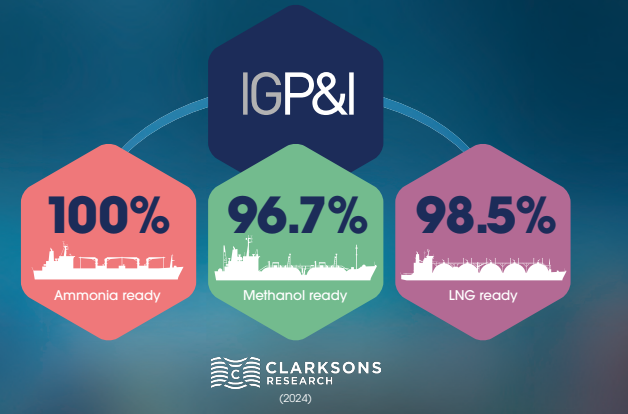The International Group of P&I Clubs has published its Sustainability report, following the first report in 2022.
This report underscores the Group’s commitment to advancing the maritime industry’s transition towards low and zero-carbon fuels through collaborative pooling arrangements and robust insurance frameworks.
Pooling of vessels using alternative fuels
The Group recognises the role that its claims sharing (pooling) arrangements and reinsurance programme can play in facilitating the industry’s transition to low or zero-carbon fuels. The Group Clubs have historically sought to meet and support the needs of shipowners by adapting to changing demands and adopting an inclusive approach to cover within the mutual system. The same approach to pooling will apply to any changing insurance needs from low or zero-carbon fuels.

Supporting shipping’s role in global decarbonisation
Because the Group Clubs insure shipowners against liabilities arising from cargo carried on board ships, the Group has had experience insuring liabilities arising from alternative fuels to the extent that such fuels have been carried as cargoes for some time, e.g., carriage of ammonia for the agriculture industry. In order to decarbonise the global economy, it will be necessary for new low or zero-carbon fuels and technologies (or the ingredients required to make them) to be transported in large volumes over long distances.
Shipping will have an important role to play in supporting the transition through the safe and efficient transportation of such fuels and technologies from source to market. This role is in turn supported by the Group Clubs through the provision of high levels of liability cover. This gives shipowners and operators confidence to invest in new technologies and infrastructure and provides governments and businesses around the world is confidence that there is a robust insurance regime, ready to respond if required.
Supporting a safe transition
Through the Ships Technical Committee, the Group participates in the IACS Technology Readiness Level Working Group and Safe Decarbonisation Panel which will review environmental and safety issues for the development and application of sustainable energy sources and technologies on board ships. The Alternative Fuels and Pollution Committees are also helping analyse the risks, potential losses and liabilities which may result from the use of alternative fuels when compared to traditional mineral hydrocarbons.
The Group’s role is to support the solutions that the industry chooses, recognising that there may be complexities in doing so. Its work with IACS will help support the case for inclusive insurance cover of alternative fuels in the maritime insurance and reinsurance markets and supports a safe transition through the identification and mitigation of risks.
Building legal infrastructure for sustainable fuels
The journey to ‘net zero’ will require more than simply developing the technology for ship propulsion using alternative fuels. There will need to be the technical, logistical and legal infrastructure in place internationally to support shipowners who invest in ships operating using alternative fuels. This will take time and planning plus access to sufficient fuels to support the transition.
Credit: IG P&I































































